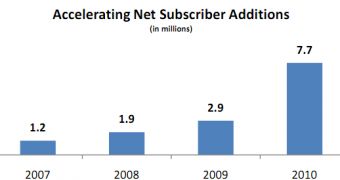Netflix revealed its fourth quarter financial results and they're looking very promising for the company. Even more interesting than the sums involved though are the growth numbers. Netflix has added 7.7 million subscribers in the US in 2010, reaching over 20 million subscribers in total.
The fourth quarter is responsible for 3.1 million of the new users and the streaming-only offering along with an increasing number of devices with Netflix built in contributed to that.
"At the start of 2010, our best estimate for net additions for the year was about 3.6 million, which shows how hard annual forecasting is when the opportunity is expanding so rapidly," Netflix wrote in its report.
Netflix brought in $596 million in Q4 2010. Profits were lower, since the company spends quite a lot on content acquisition. Operating income was $78 million and net income was $47 million.
The company expects the first quarter of 2011 to be equally successful and estimates it could end Q1 with 22 million to 23 million subscribers.
However, Netflix is worried by a trend from ISPs which are increasingly displeased with not making more money from the traffic they're already paid to transport. Many have been asking Netflix to start paying them for the video content that goes through their pipes.
This despite the fact that Netflix pays for bandwidth, quite handsomely, to its own provider and that customers pay ISPs for the services they provide. Netflix plans to counter the moves by showing how various ISPs in the US are doing in terms of video streaming.
"We’ll publish on our blog ongoing performance statistics about ISPs collected from our 20 million subscribers detailing which ISPs provide the best, most-consistent high speed internet for streaming Netflix," Netflix announced.
"Today, some ISPs charge us, or our CDN partners, to let in the bits their customers have requested from us, and we think this is inappropriate. As long as we pay for getting the bits to the regional interchanges of the ISP’s choosing, we don’t think they should be able to use their exclusive control of their residential customers to force us to pay them to let in the data their customers’ desire," the company explained.

 14 DAY TRIAL //
14 DAY TRIAL //